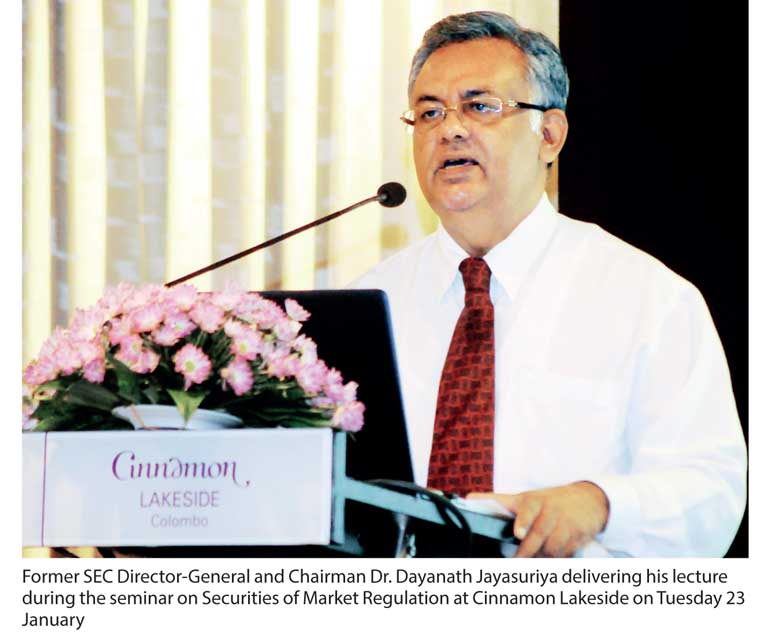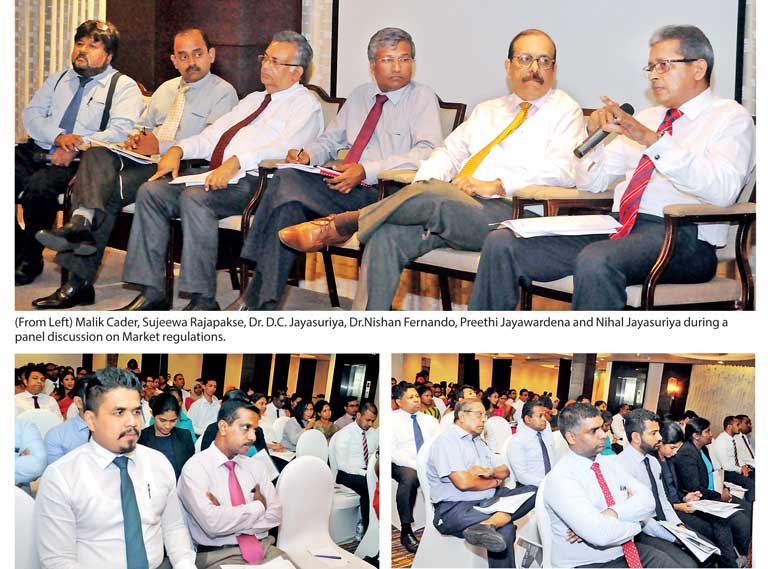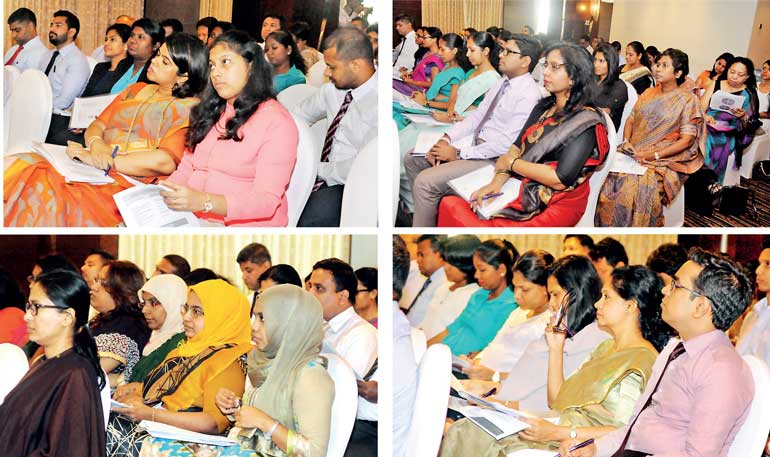Sunday Feb 22, 2026
Sunday Feb 22, 2026
Friday, 2 February 2018 00:00 - - {{hitsCtrl.values.hits}}


 By Himal Kotelawala
By Himal Kotelawala
Stressing that a complete overhaul of the Securities Exchange Commission (SEC) Act was long overdue, and lauding the proposed Securities Exchange Bill for a number of its more salient features, former SEC Director-General and Chairman Dr. Dayanath Jayasuriya last week cautioned against moving towards an environment of over-regulation.
Delivering an hour-long presentation on the implications of the new Bill, Dr. Jayasuriya noted the draft bill addresses many gaps and offers clarity with regard to certain matters and also casts a very wide net to capture all market participants.
Regulations, rules, and directives will further shed light on how the Bill, once enacted, will be enforced, he said.
“Certain clauses envisage considerable resources and technical skills which even developed securities markets jurisdictions often find difficult to enforce. From under-regulation, we should avoid moving rapidly towards over-regulation,” he said.
Advocating for a balance between these two states, Dr. Jayasuriya said until that right balance was struck, a path studded with pitfalls would necessarily need to be followed.
“Corporate entities, the community of market players and the public must make every genuine endeavour to facilitate the enforcement of this important new piece of legislation so that Sri Lanka can have a truly vibrant and transparent securities market,” he said.
As different parts can be brought into operation on different dates, he went on to say, there is a window of opportunity for the regulatory structure as well as technical skills of the SEC staff to be gradually developed.
There needs to be greater clarity with regard to some of these problem areas, but they can be rectified when the Bill is being debated in Parliament, he subsequently told Daily FT.
Comparing the draft bill with the SEC Act of 1987 (as amended), Dr. Jayasuriya said the new bill has 183 clauses, whereas the “rather rudimentary” current Act has 57 sections.
The proposed bill seeks to expand the powers of the Commission and confer more rights, impose duties and introduce remedies.
“The new bill is significant in that it provides for stricter regulation and oversight,” he said, adding that the existing Act employs a soft-touch approach.
According to Dr. Jayasuriya, the new bill gives prominence to investor protection and systemic risk of paramount concern, while the SEC Act is empowered with limited intervention.
The duties of auditors have been augmented in the new bill, although, said Dr. Jayasuriya, auditors have so far done a “good job” on a voluntary basis.
Among the new bill’s highlights is whistle-blower protection and civil remedy for insider dealing. Currently, only criminal prosecution for insider dealing.
The new Bill also seeks to capture more market participants.
The primary objective of the bill is as follows: Establish the SEC by repealing the SEC Act.
Dr. Jayasuriya believes the new provisions are of a far-reaching nature.
Other objectives include regulating market institutions, public offers of securities and market intermediaries, dealing with market misconduct, and meeting challenges encountered by securities markets in an effective and efficient manner.
“There are some concerns whether this can be achieved with the provisions in the bill,” he said, referring to the objective of meeting securities market challenges.
The bill will also provide for various incidental matters.
Barring some exemptions, the bill will apply to listed public companies and listed foreign entities.
According to Dr. Jayasuriya, the main objective of Part 1 of the bill is to establish the SEC for the “creation and maintenance of a fair, efficient and transparent securities market.”
While the emphasis has hitherto been on local investors, Part 1 seeks to protect the interest of investors both local and foreign.
It also seeks to ensure the maintenance of high professional standards in the provision of services under the Act, and to also mitigate systemic risks in the financial system.
This, according to Dr. Jayasuriya, is a function that revolves around the Central Bank. It’s very unusual to find statutes empowering the SEC to mitigate systemic risks, he said.
“Nevertheless, there may be situations where the SEC can consult the Central Bank and take measures. The bill does provide for a memorandum of understanding to be entered into between the SEC and any other entity,” he added.
The SEC, as per the new bill, will comprise 10 members including six appointed by the Minister. One significant change, however, is that a fellow of the Institute of Chartered Accounts of Sri Lanka who is not engaged in auditing as nominated by the Council of the Institute of Chartered Accountants (instead of the President serving ex officio).
In making appointments, the Minister has to take into consideration the “likelihood of any conflict between the interests of the Commission and any interest which that person has or represents.”
According to Dr. Jayasuriya, there is specific provision for a member to disclose his/her interest (direct or indirect) in the matter under deliberation and not participate (“shall withdraw from such meeting”).
“There is a statutory requirement to withdraw from the meeting. But looking at the criterion, it creates a problem in that it will be difficult for the Minister to anticipate that a situation would arise where there could be possibly be a conflict,” he said.
“Unless of course you have an astrologer on your board like the NSB had a few years ago,” he added, in a lighter vein.
A person shall be disqualified from being appointed or nominated or from continuing as a member of the Commission if he is guilty of serious misconduct in relation to duties, abuses his position so as to render his continuation in office detrimental to the interest of the Commission, fails to comply with his obligations under the provisions of the Act, or has been previously removed from office under this section.
With regard to representation of the Commission in legal proceedings, the SEC Chairman may authorise any officer of the Commission who is attorney-at-law to appear on behalf of the Commission in any legal proceedings by or against the Commission or in any proceedings in which the Commission has a substantial interest.
The practice has so far been to consult the Attorney General, according to Dr. Jayasuriya.
The Director General will be appointed by the Commission (currently appointed by the Minister on the recommendation of the SEC). According to Section 18 (5), the Commission may remove the DG from office by a two thirds majority taking into his integrity or standing, the likelihood of any financial or any other conflict of interests in the affairs between the Commission and the DG.
“The question arises as to why the Bill provides for a two-thirds majority, when it should be a unanimous decision. Or the Minister should decide, because the DG can be on very friendly terms with certain Commission members, thus defeat the possibility of a two-thirds votes against him,” said Dr. Jayasuriya.
He may also be removed if he becomes of unsound mind or incapable of carrying out his duties. The DG will face removal if he is guilty of serious misconduct in relation to his duties or is involved in any activity which may interfere with his independence in discharging his duties. Any move to remove the DG will be on the condition that the Commission shall grant an opportunity to the DG of being heard.
Section 26 (3) reads: “Notwithstanding the provisions of any other law, a director of an Exchange has a duty to act at all times in the public interest, having particular regard to the need to protect investors and where there is a conflict between the duty under this Act and a director’s duty under any other law, the duty under this act shall prevail.”
“This is a very strange provision, because increasingly the literature shows that those who launder make use the Stock Exchange to launder funds,” said Dr. Jayasuriya.
The former SEC DG said that the Prevention of Money Laundering Act and the Financial Transactions Reporting Act will not prevail over the SEC, observing that, currently, those two laws prevail over the SEC.
Unless it’s judiciously implemented, he said, this will facilitate the Stock Exchange being used to some extent by people who want to launder funds.
Another problematic area in terms of interpretation highlighted by Dr. Jayasuriya concerns the Central Depository.
Section 57 (2) of the draft Act reads: “The rights and duties attached to the securities maintained in the accounts of the central depository held by a nominee shall be exercised by the beneficial owner identified in the respective account held in the central depository as if he is the holder of those securities.”
“There could be a situation where the nominee could give certain instructions and contrary instructions given by the beneficial owner,” said Dr. Jayasuriya.
General provisions as spelt out in Section 60 (1), regarding any person who is under a duty to comply, observe, enforce, or give effect to the rules of a market institution, are also of concern.
“The SEC, as the authority to register market intermediaries, should have the power to take legal action market intermediaries who don’t give effect to any orders of the SEC.
“The need to go to a court of law doesn’t really arise, unless of course there’s a situation where one could regard it as a contempt of the powers of the SEC. But here the procedure is different. If an entity chooses to ignore the directives of the SEC, the law requires the Commission to file application in a court of law,” said Dr. Jayasuriya, warning that this could result in a “month of Sundays” to resolve the matter.
Section 61 (1), on the control of substantial shareholders of a market institution, reads: “A person other than a representative of the government shall not enter into any agreement or arrangement to acquire any voting shares of a market institution either individually or together with any other person acting in concert with him, exceeding five per cent or more of the aggregate of all the voting shares in a market institution, without obtaining the prior written approval of the Commission.
The policy so far has been allow the private sector to take the initiative, said Dr. Jayasuriya.
“One wonders why a Government representative should become a shareholder of a market institution,” he said.
With regard to SEC approval for the issue of securities, one clause states that a listed foreign entity shall obtain the approval of the Commission or any person authorised by the Commission for a public offer of securities at the time of listing on an Exchange.
Dr. Jayasuriya is of the opinion that this power ought to be vested with the Commission and not with any authorised person nominated by the Commission.
When it comes to appointing directors or CEOs of a listed public company, section 84 (1) states such a company shall maintain the status of a listed public company on the Exchange as specified in the rules of an Exchange.
There is, however, confusion with regard to subsection (2) that states the directors or the CEO of such company shall comply with the fit and proper criteria as specified by the Commission, or in the rules of an exchange in appointing or maintaining directors or CEO.
“I can’t understand why they have used the word ‘or’, because strictly speaking both directors and the CEO must have comply with the fit and proper criteria,” said Dr. Jayasuriya.
“One doesn’t know whether there was a deliberate to allow certain companies to have certain directors who are not fit and proper while the CEO is able to say ‘well, I’m fit and proper,” he added.
Dr. Jayasuriya finds Section 129 “very peculiar.” It reads: “The Commission may make rules to exempt any particular class, category or description of persons or any particular class, category or description of transactions relating to securities to which section 124 or 125 does not apply.”
“The bill doesn’t provide for any criteria to grant these exemptions, and the questions arises whether there isn’t a level playing field,” he said.
The draft bill identifies an “insider”, whether he or she is connected to the respective company or not, as a person who possesses information that is not generally available and, if it were available, a reasonable person would expect it to have a material effect on the price or the value of securities, and knows or could reasonably be expected to know that the information is not generally available.
Section 153 (2) (d) says that the SEC may receive funds from any source whatsoever.
“So if some of the companies implicated in the bond report, for instance, want to make a contribution to the SEC, this enables the Commission to receive the funds, providing red carpet treatment,” said Dr. Jayasuriya.
According to Section 156 (1), which deals with the compensation fund, only limited compensation is available and only if the investor has no other remedy.
“One cannot understand why compensation has to be limited. Compensation has to be paid, and there has to be a basis for calculation. In most situations, the investor has a remedy, but that remedy would require a month of Sundays,” said Dr. Jayasuriya.
Pix by Geethika Talukdar